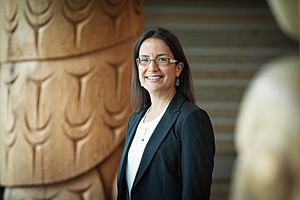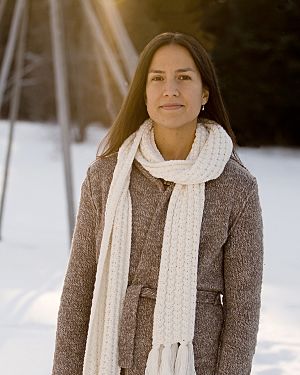Nadine Caron facts for kids
Nadine Rena Caron, born in 1970, is a very important Canadian surgeon. She made history as the first female general surgeon in Canada who is of First Nations descent (from the Ojibwe people). She was also the first First Nations woman to graduate from the University of British Columbia's medical school.
Contents
Early Life and Education
Nadine Caron grew up in Kamloops, British Columbia. Her mother was Ojibwe and a teacher. Her father was an immigrant from Italy and worked as a mason. She is part of the Anishnawbe people from the Sagamok Anishnawbek First Nation.
School and University
Nadine went to Simon Fraser University. In 1993, she earned her science degree in Kinesiology. This is the study of how the body moves. She was also a fantastic basketball player there. She won many awards, including the Shrum Gold Medal. This award goes to the best undergraduate student.
Later, she studied medicine at the UBC Faculty of Medicine. Again, she was the top student. She also earned a master's degree in Public Health from Harvard University. This happened while she was training to become a surgeon. She also did special training at the University of California, San Francisco. This training focused on surgery for glands that produce hormones.
Special Recognitions
Nadine Caron has received several special honors. In June 2017, she was given an honorary Doctorate of Laws from the University of the Fraser Valley. In October 2019, she received another honorary degree from Simon Fraser University. These degrees recognize her amazing achievements.
Nadine Caron's Career
Dr. Caron works as a general and endocrine surgeon. She helps patients at the Prince George Regional Hospital. She is also a professor at the UBC Faculty of Medicine. In 2014, she became a Co-Director of UBC's Centre for Excellence in Indigenous Health. This center works to improve health for Indigenous people.
Awards and Research
In 2016, she received the Thomas Dignan Indigenous Health Award. This award came from the Royal College of Physicians and Surgeons of Canada. She was recognized for her studies on public health. Her work focused on people living in rural areas and First Nations communities.
Dr. Caron also leads the Northern Biobank Project. This project helps patients in northern British Columbia. It makes it easier for them to take part in research. This research helps create personalized medicine. Personalized medicine means treatments are made just for you.
She is also a faculty member at the Johns Hopkins Bloomberg School of Public Health.
Important Committees
Nadine Caron has been part of many important groups. These include the Native Physicians Association of Canada. She also served on the British Columbia's Medical Association's Committee on Health Promotion. She was also on the Ministry of Health's Advisory Committee on Provincial Health Goals. These groups help make health better for everyone.
In 2020, she became the first person to hold the First Nations Health Authority (FNHA) Chair in Cancer and Wellness at the University of British Columbia. She also helped start UBC's Centre for Excellence in Indigenous Health with Martin Schechter.
She is also a professor at the University of Northern British Columbia. She works with the University of British Columbia's School of Population and Public Health. She is also a scientist at the BC Cancer Agency's Genome Sciences Centre.
Honours and Awards
Nadine Caron has received many awards for her hard work and dedication:
- Shrum Gold Medal, Simon Fraser University, 1993. This was for being the top undergraduate student.
- Awards from the University of British Columbia, Faculty of Medicine, 1997:
- Hamber Medal
- Dr. Jay C. Cheng Memorial Education Foundation Prize
- Dr. Jack Margulius Memorial Prize
- Top graduating student in Medicine, MD degree, and best overall record.
- Dr. John Big Canoe Memorial Scholarship, Canadian Medical Association, 1997.
- Named one of "100 Canadians to Watch" by Maclean's Magazine, 1997.
- Outstanding Alumni Award, Simon Fraser University, 2011.
- Dr. Thomas Dignan Indigenous Health Award, Royal College of Physicians and Surgeons of Canada, 2016.
- Named one of "Women of the year: 12 Canadians who rocked 2016" by Chatelaine Magazine.
- Honorary Doctor of Science, Simon Fraser University, 2016.
- Wallace Wilson Leadership Award, University of British Columbia Medical Alumni Association, 2017.
- Honorary Doctor of Laws, University of the Fraser Valley, 2017.
- Inducted into the Athletic Hall of Fame, Terry Fox Humanitarian Category, Simon Fraser University, 2019.
- Inclusive Excellence Prize, Canadian Cancer Society, 2020.
- Became a Member of the Order of BC, 2022.
- Became a Director for the Terry Fox Foundation in 2024.
- Will be inducted into the Canadian Medical Hall of Fame in June 2025.
Research on Indigenous Health
Dr. Caron's research focuses on the health of Indigenous people. She also studies Canadian health policies. She has made important discoveries about health differences in Canada.
Health Differences
Her research showed that First Nations people in British Columbia have higher rates of some cancers. They also have lower survival rates for almost all cancers. This is compared to people in B.C. who are not First Nations.
She also led a study that found something important. Indigenous peoples are 30% more likely to die after surgery. This is compared to non-Indigenous peoples. Her work helps highlight these issues. It also helps find ways to make health care fairer for everyone.
 | George Robert Carruthers |
 | Patricia Bath |
 | Jan Ernst Matzeliger |
 | Alexander Miles |



